#friendship ended with dog motif trust motif is my new best friend
Explore tagged Tumblr posts
Text
why is the tomgreg thesis just ‘even when i don’t trust you, i trust you.’
#do you know what i mean?#like greg can ‘betray’ tom a million times (either intentionally or not)#and tom will always fight for him#the sticker scene being the biggest example#bc tom could have easily let greg go if he really wanted#but he *didn’t* and that’s the point#also the fact that all of greg’s betrayals are always strictly business he never betrays tom personally#but tom makes it personal bc he can’t separate the two bc of shiv#and his own messed up brain#there are times when tom can’t trust him but he still trusts him implicitly#..the trust motif#sorry i’m thinking about the bomb bc i got comments on it and it sparked this#the trust motif is very heavily featured in the bomb#why do i always get like this when i’m sleep deprived imao#bc i can never articulate what i mean#not that i could anyways but still#trust motif!! it’s a thing!#friendship ended with dog motif trust motif is my new best friend#i will always be biased towards the deer motif tho sowwy <3#gwen rambles#gwenposting
1 note
·
View note
Text
My upbringing was starkly black and white, everything strictly categorised as sin and acceptable, allowed and not. The massive ‘sin: not allowed’ category swallowed everything in legalism and immutable consequences. I fell in love with noir partly because it has no such hangups.
I savoured noir’s evocative language and sexual undercurrent. I learned to believe exposing repressive authority and dirty deeds was valiant even if ultimately futile, and justice could be delivered even when corrupt systems stymied it. The hardboiled detective attracted me from every angle, and I dreamed of both being and fucking the daring mystery-solving, smoking, drinking, dame-bedding wiseass. The detective archetype is dangerously appealing; stalwart antiheroes holding to their personal code while all around them people sold their souls for a bottle of scotch, a land deed, a tempting woman or a hard man. Terribly tragic, and as such, terribly romantic.
Like a suspect in a smoky dive bar, what constitutes ‘loyalty’ in noir is hard to pin down, but while most supporting characters treat loyalty as a purchasable, expendable, flexible commodity, [anti]heroes Spade and Archer, Gittes and Dewitt, Mars and Hammer, et al. hold fiercely to their personal definitions thereof. These ideals often keep them from working with a partner, as they can’t find others who share their notions longer than a book’s opening chapters, a film’s first act. Sometimes, in a twisted blessing, their partner gets murdered before committing betrayal. (‘Committing betrayal.’ What a cruel grammatical construction.)
Fairly unique among their set, Charleses Nick and Nora manage loyalty and happiness to and with each other, but not only does their teasing openly relay insecurities in everyone outside their connubial circle, their origin story is shot through with loyalty conundrums. The crux of The Thin Man revolves around characters leveraging Nick’s allegiance to an old friend to make Nick and Nora investigate a suspicious death/disappearance, similar to the relationship between Marlowe and Terry Lennox in The Long Goodbye.
Marlowe: You didn’t have much choice, huh? So you used me. Lennox: Hell, that’s what friends are for.
Many noir tales examine murder, corruption, lost love, incest, power, grasping for companionship in sex and booze and partners. Few are so nakedly about friendship, loyalty, and the unique betrayal they set you up for as The Long Goodbye. As the game Lennox and Marlowe play in their first scene tells us, all Marlowe’s relationships are games of liar’s poker he’ll lose. The only question is: sooner, or later?
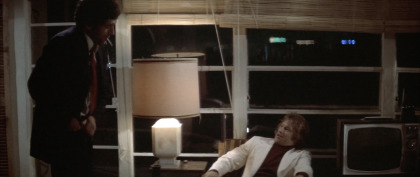

The film’s opening involves the great Philip Marlowe cajoling his hungry cat to eat first a concoction of cottage cheese and raw egg, then generic cat food. The two mewl, mumble and scratch in their understanding standoff. The film ends with Marlowe coolly justifying shooting his once-friend because Lennox indirectly killed the cat. Everything between is a meditation on loyalty.
As best exemplified in Nick and Nora Charles, noir understands relationships featuring fidelity and comfortable insults are the ones which really matter, so the snarky–sweet caring–codependent way Marlowe and hungry cat banter intentionally evokes true friendship. Altman called that opener important and Marlowe’s relation to his cat commentary on friendship: no matter how hectic his life, Marlowe is concerned the cat eats, whether the cops scare him, if he’s lost in LA’s mean streets.
Like most of his genre, Marlowe is destined to traverse the criminal underworld, continually learning the hard way he’s more loyal to friends, clients, even his constantly stoned neighbours, than they to him. He can’t bring himself to act on his cynicism until he’s burnt, and is a lost soul not because he’s dumb or drugged – he turns down even his neighbours’ hash brownie – but because he can’t find anywhere to put his trust.
Though they harass him and he blusters against their threats and handcuffs, Marlowe’s relationship with the cops is his most stable. He despises their work, they hate and stymie him, but at least he knows where he stands. Everywhere else is shifting sand and empty promises, golden and glittering by daylight, cold and dangerous at night. Under it all play morphing renditions of “The Long Goodbye,” refrains evolving and fading as quickly as relationships, adding atmosphere as Los Angeles underworld characters succour the detective and each other until betrayal becomes convenient.
As he searches for answers in mysteries and others, Marlow smokes to dull the pain – take a shot every time he strikes his match on a new surface, you’ll be drunk before the halfway point. Elliot Gould’s physicality superbly conveys Marlowe’s hurt and insecurity, shambling gait literalising existentially unsure footing.
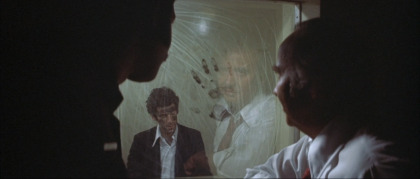
Altman’s shots and Zsigmond’s cinematography also expose Marlowe’s mental state. The beautiful police station tracking shot puts us in Marlowe’s gumshoes, showing his strain as he attempts to sort through the mountain of information, theories, and grief he’s been buried under. The long dolly across the grounds of the clinic has a similar effect, moving first methodically, then more frenetically as Marlowe’s frustration builds. Exposition of addresses and phone numbers unroll with slow camera movements over long takes, revelling in the acting’s stillness, taking a less usual route than montages to make the viewer feel Marlowe’s tedium and loneliness.
The odyssey is wrapped in perfectly exposed beach scenes, daytime sands yellow-tinged and California to their core, nighttime painted deep blacks and grainy red with Eileen’s dress the only spot of yellow. Doubled imagery and symbols of duplicity abound, the most striking of which involve the beach. First we see Marlowe in the glare off Wades’s window, projected between quarrelling lovers as they snipe at each other. Later, in the same window, Eileen is shown two-faced as she and Marlowe talk while her husband charges suicidally into the inky sea.

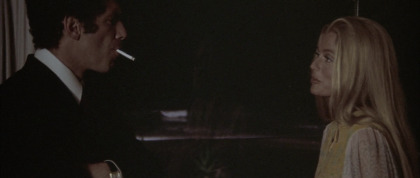
The whole film is a gorgeous depiction of our ugliest impulses, and Altman is the perfect director for it. Through various lenses and genres, Altman’s work examines intimacy and pain which can be leveraged by only those closest to us. Noir’s peripheral characters are who many of Altman’s other films center: desperate, impotent men; disloyal lovers; marriages on the verge; frustrated humans performing drastic acts. The Long Goodbye digs into side stories many noirs don’t unless impacting the protagonist directly: Farewell, My Lovely is more concerned with Marlowe’s relationship to the women in his path than the women themselves; American Gigolo hardly contains a conversation Julian Kaye isn’t in; Evelyn’s relationships in Chinatown mostly evolve when Jake is around to observe, and he’s around almost every frame. Some of The Long Goodbye’s more virulent events or breakdowns happen while Marlowe is out of the picture, or listening to nothing but crashing waves.
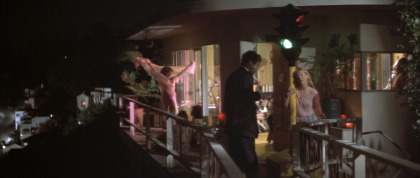
Altman is interested in examining these stories for their own sake, and shows it by examining side characters with the reflections motif, too. Zsigmond uses Eileen’s windshield brilliantly to reflect her facade as Marlowe chases her through the streets. The stoned hippy neighbours are introduced surrounded by floor-to-ceiling windows, one dancing with herself in the mirrored glass. The gate-guard-slash-impression-artist is reflected in Harry’s shiny car sidepanels, a symbol of security who pretends to be many other people, then shows himself more trustworthy than people pretending to be someone they’re not.
The guard also displays The Long Goodbye’s wicked sense of humour, along with the horny lookout whose ogling of stoned half-naked neighbour women allows Marlowe to sneak away. There’s the slapstick of Harry swinging haplessly on the gate trying clamber over as he imagines a detective should. Marlowe plants a sloppy handprint on the interrogation cell two-way mirror, then paints his face with fingerprint ink, cops impotent to stop his clowning. The guard dog fetching her owner’s stick from the waves has a twisted hilarity to it.
Which brings us, as the film continually does, back to loyalty. Relationships with animals are throughout: besides his cat, Marlowe nervously banters with the guard dog and talks as cheerfully as a damned man can to strays lying in the road. Ultimately animals’ loyalty – even only to the hand that feeds and then betrays them, pictured perfectly with mounted ducks – is still stronger than that of everyone else in his life, and loyalty is important to him.
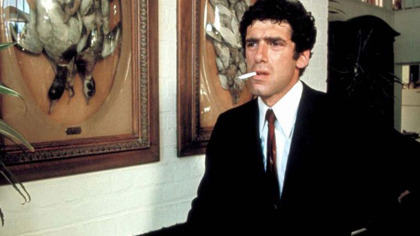
If only I’d recognised earlier how much my identifying with pulp heroes was due to my own sense of loyalty, deservedness of recipients be damned. “Their cynicism exactly stems from their compassion, [their] hardness is a scar tissue of a heart they can’t stop the world from breaking over and over.” I weirdly admired Marlowe hoping against hope, believing those he loves once, then again. You know what they say about fools.
Marlowe: Nobody cares but me. Lennox: Well that’s you, Marlowe. You’ll never learn, you’re a born loser.
The Long Goodbye is Chandler’s most personal work. “You writers have your own special way of describing, don’t you?” is the movie acknowledging this sure as Chandler’s book commented on his deep insecurities, ideals, and philosophies. (The film references the book many times, including the face-bandaged man as a nod to Book Terry’s extensive plastic surgery.) Roger Ebert said in his original review, “The private eye as a fiction device was essentially a way to open doors; the best novels of Chandler and the others are simply hooks for a cynical morality.” Like Inherent Vice, the criminal underworld is alluring backdrop and murder the smaller mystery behind the real question of whether the detective can uphold his personal code in a world where ‘a man is only as good as his word’ simply means most men are no good. The real question, the crux and heart of the matter, is Will they keep clinging to that code? Why do we keep falling for those who throw us over?
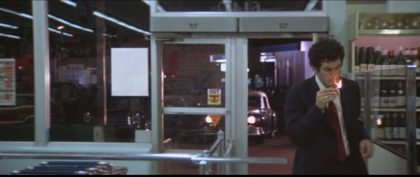
The thing about franchised noir detectives is, as characters or story properties, they can’t fundamentally change. They solve mysteries, their settings are updated from 50s to 70s to aughts to 2019, they jadedly swear they’ll never trust again, they may seem to learn their lesson. But in the end the stories reset. Sure as sunset and the next story, they get let down, used, double-crossed, stung, only to begin again when the next sultry shadow darkens their door. Once again they give their loyalties to a friend in need, a dame with legs up to there. Once again the dames and mates evaporate; or worse, explicitly sell our fallible hero upriver, relying on said hero’s tragically loyal personal code to prevent retaliation.
We’ve all had those dames and mates. We’ve all sworn to never love again, only to willingly set ourselves up for more heartbreak. People who mean what they say only so long as they feel like it. Family who love you so long as you’re meekly in line. Dames who say “I love you” in the night and “I’m leaving you” in the morning. Business partners who call you family until it’s more expedient not to be. Friends who say forever but mean for as long as you’re fun, and you’re no fun when you’re stumbling through a haze of pain or grief. Homme fatales who sell you out when a better offer comes in. Lovers who are loyal while you do exactly what they want.
In the first of two crucial scenes which start placidly before exploding into brutal violence, thug Marty gives a speech to/about his girlfriend Joanne. “Delicate and sweet . . . I love you. I do. . . . The single most important person in my life.” Ah, love, the highest form of loyalty.
Then he hits her across the face with a glass bottle.

Do we feel sorry for her? is the same question Tarantino asks in Once Upon A Time… In Hollywood when Brad Pitt’s Cliff smashes sadistic Sadie’s face with a can of dog food. The blow to Joanne’s face is lighter and unprovoked, but though her crimes are lighter, her madonna-like framing is window dressing. She blithely enjoys fruits of Marty’s torture, murder, and extortion, knowing her flippery is bought with blood money. (Her blow’s aftereffects are visually replicated by Jake’s bandages in Chinatown – directed by Polanski, who is depicted in Once Upon A Time, making these films a Möbius strip of themes, imagery, period, and settings.)
In different ways, Joanne and Sadie establish The Long Goodbye and Once Upon a Time‘s cruel worlds, where psychopaths and rich ruthless men get their way. Both center men with drinking and smoking habits, a dubious past, and a personal moral code. Marlowe and Cliff fight against the establishment, for themselves and their friends. Though they don’t believe in innocence, they want to believe people exist whose souls at least aren’t as dark as the rest of ours. Within their morality is loyalty; Cliff to Rick Dalton, Marlowe to Terry or at least the idea of him: “Terry Lenox was my friend you motherfucker . . . you don’t deserve to be alive you fuckin’ pig.” Rick and Terry don’t return the loyalty, yet Cliff and Marlowe can’t help themselves. It’s their code.
The Long Goodbye ending Ebert calls “off the wall” I see as wish fulfilment, same as Once’s. In the film Terry gets justice delivered by Marlowe, Bracket’s screenplay ‘fixing’ the book’s injustice. Altman revels in this playground where disloyalty equals death and real world consequences are momentarily suspended for a warped fairy tale ending.
The final shot is reminiscent of Holly Martins waiting on a tree-lined boulevard in The Third Man, another film featuring a man unendingly loyal to a death-faking friend who didn’t deserve such fidelity. The Long Goodbye’s last shot brings yellow in again, reminding us of Eileen’s dress, the faded sun on the beach, letters and pledges of friendship aged and brittled by time. Only here, Marlowe’s the one walking away, getting as happy an ending as one can hope for in noir.
This slideshow requires JavaScript.
Lennox blindsided Marlowe, then called him a fool for expecting others to do what he would in keeping his word. Pulp detectives are thrown under the bus or off a cliff with the shrugged excuse along the lines of “I knew you were tough enough to survive” or “sorry, you were just collateral damage.” Given enough time, “I threw you under the bus to save myself” becomes “It was the best option for both of us” becomes “you survived and are better for learning this lesson, you should be thanking me!” This essay draws parallels to Marlowe and Veronica Mars’ getting run over because of their clinging to loyalty, “an anchor that binds.”
But every detective also has their breaking point, the point at which they say the rules have been violated enough to justify them taking matters into their own hands.
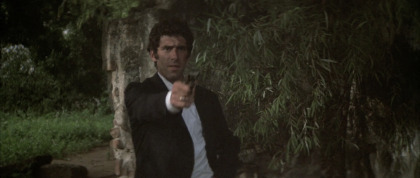
Marlowe: I have two friends in the world. One is a cat. The other is a murderer.
Is loyalty its own reward? Chandler’s book seems to argue it is, but Marlowe shooting his once-friend in the film argues something else. Grown and free of the romanticised prism Younger Me viewed Marlowe through, do I believe Chandler’s ending or Brackett’s?
The teenager who first read Chandler’s book would choose idealism: be true to your code, give your loyalty, those who turn on you will get what they deserve while you can keep the moral high ground. Even with grim answers in front of me, maybe I’d make like Marlowe, clinging stubbornly to loyalty disavowed by its recipient, or keeping myself preoccupied searching for answers and other mysteries.
While I want to hold to those ideals still, what are movies for if not to show us what we really want, wish-fulfilling our basest instincts? Watching now, I can’t help but savour that moment Marlowe tosses his cigarette, reaches into his waistband, and coolly shoots the man who treated his loyalty as commodity.
For #Noirvember, I wrote about the concept of loyalty in noir in general, and "The Long Goodbye" in particular. My upbringing was starkly black and white, everything strictly categorised as sin and acceptable, allowed and not.
0 notes